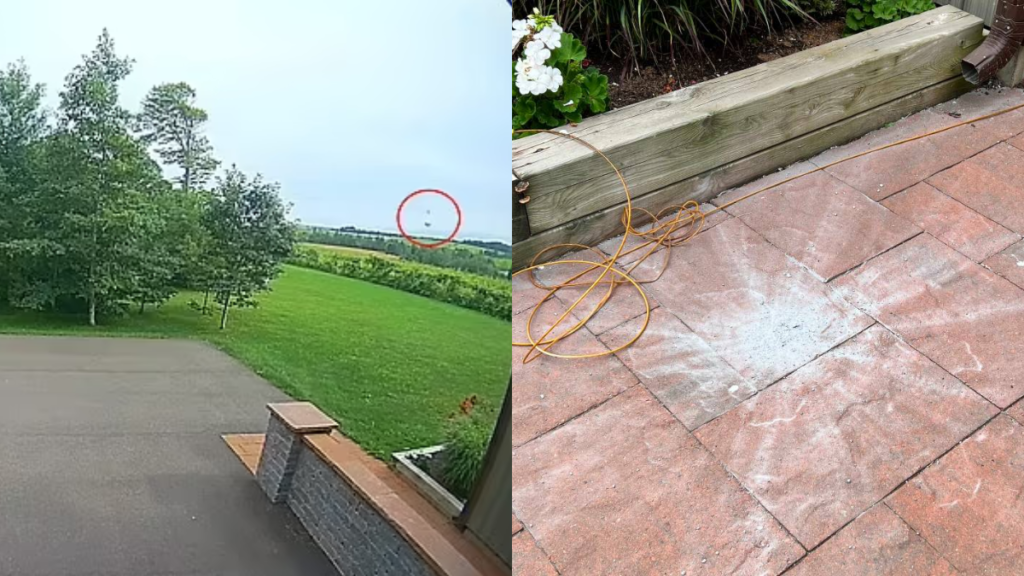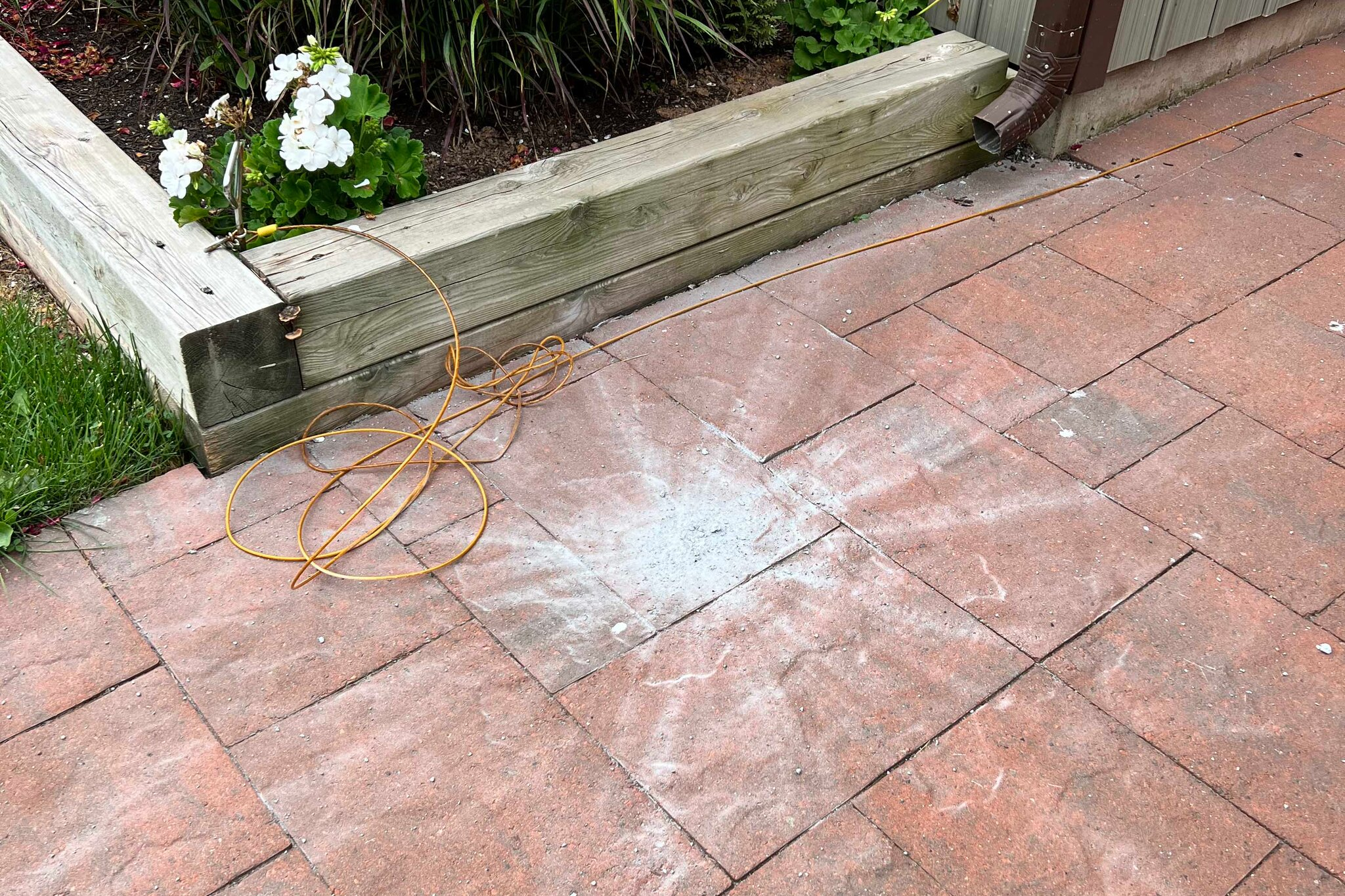In a groundbreaking event that has captivated the scientific community and the general public alike, the sound of a Meteorite Hitting Earth has been captured for the very first time.
This unprecedented event took place in July 2024 on Prince Edward Island, Canada, where a doorbell camera recorded the exact moment a meteorite hit the ground with remarkable clarity. The discovery not only adds a new chapter to our understanding of meteorites but also provides valuable data that could advance scientific research on celestial bodies.
The Meteorite Impact and Its Remarkable Capture
On a seemingly ordinary day in July 2024, a couple living on Prince Edward Island experienced something extraordinary: a meteorite crashing into their property.
Laura Kelly and Joe Velaidum, the owners of the house where the impact occurred, were initially unaware of the dramatic event that had taken place just outside their door. It was only when they noticed a star-shaped mark in the walkway that they began to investigate the cause.
As part of their inquiry, they decided to review footage from their doorbell camera, which had conveniently captured the entire incident. What they discovered was nothing short of remarkable—video footage showing a high-speed rock hitting the ground and creating a 2cm by 2cm hole in the walkway.
Read : Edinburgh University Warns Wealthy Students Against Snobbish Behavior
The footage not only captured the impact but also provided the first-ever audio recording of a meteorite strike, a sound that had never been documented before.
The discovery of the Charlottetown Meteorite, named after the nearby city of Charlottetown, marked a historic moment in meteorite research.
That's the sound of a little meteorite smashing into Earth, caught on doorcam.
— Chris Hadfield (@Cmdr_Hadfield) January 16, 2025
video: Joe Velaidum
more info: https://t.co/hVWP2J2mA9… pic.twitter.com/E09kqxXQoN
While meteorites are a common occurrence, the sound of a meteorite strike has never been captured on Doorbell Camera until now. The footage has since been shared with the scientific community, sparking interest and excitement among experts.
The Scientific Significance: A New Perspective on Meteorites
According to Dr. Chris Herd, the head curator of the meteorite collection at the University of Alberta, the capture of both the meteorite’s impact and its sound represents a major scientific milestone.
Dr. Herd, an expert in meteorite studies, remarked that this event was entirely unprecedented. “It’s not anything we’ve ever heard before. From a science perspective, it’s new,” he said in an interview with CBC News.
The meteorite in question was identified as a chondrite, a type of rock that consists of the earliest materials from the solar system. These primitive rocks are remnants from the formation of the solar system about 4.6 billion years ago and provide scientists with a rare glimpse into the conditions that existed at the dawn of our cosmic neighborhood.

Dr. Herd further revealed that the meteorite had traveled an astounding 330 million kilometers from the asteroid belt between Mars and Jupiter, before finally colliding with Earth at an estimated speed of 200 kilometers per hour. This immense journey and the velocity at which the meteorite struck the ground speak to the power of such cosmic events.
The meteorite’s composition and its journey to Earth have important implications for the study of meteorites and asteroids. While meteorites are often collected after falling to Earth, the addition of sound and video data offers an entirely new perspective for researchers.
The meteorite’s characteristics, including its high speed and distance traveled, provide essential information for understanding the processes that lead to meteorite impacts on Earth.
The Meteorite’s Legacy and Impact on Meteorite Research
What makes this meteorite discovery particularly significant is not only the fact that it was the first recorded impact but also its role in advancing meteorite research. Dr. Herd explained that the University of Alberta receives around 10 meteorite-related inquiries each week, but nearly all of these turn out to be misidentifications.
In fact, only a small percentage of those inquiries result in the discovery of a true meteorite, making the Charlottetown Meteorite even more extraordinary.

The meteorite was collected by the homeowners, Laura Kelly and Joe Velaidum, who initially had doubts about its authenticity. It was Laura’s father who suggested they submit the rock to the University of Alberta’s Meteorite Reporting System, prompting the investigation into its true nature.
Once the meteorite was identified as such, the couple cooperated with Dr. Herd to collect and send 95 grams of the meteorite’s remains for further analysis.
The meteorite has already provided valuable data to scientists at the University of Alberta, where ongoing research aims to understand the meteorite’s composition, age, and cosmic origin.
Such research helps improve our knowledge of the solar system’s formation and the processes that lead to asteroid and meteorite impacts on Earth. Furthermore, the unique nature of the sound recorded by the doorbell camera could provide valuable insights into the nature of meteorite impacts in general.
The importance of this discovery goes beyond the immediate scientific community—it could also spark greater public interest in space science and meteorite research. As more people become aware of meteorites and their significance, the likelihood of other similar discoveries increases. It is hoped that such events will inspire a new generation of scientists to explore the mysteries of space and the origins of our solar system.
A Groundbreaking Moment in Meteorite Science
The recording of the first-ever sound of a meteorite hitting Earth is a landmark event that has captivated both scientists and the general public.
The Charlottetown Meteorite’s impact, which was captured on a doorbell camera in Prince Edward Island, has provided researchers with valuable data on the nature of meteorite impacts and the journey these rocks take through the solar system.

For Laura Kelly and Joe Velaidum, this remarkable discovery will forever be a part of their lives. Not only did they witness the meteorite strike their property, but they also played a pivotal role in advancing scientific knowledge by sharing their findings with experts.
As meteorite research continues to evolve, this unique event will stand as a testament to the power of curiosity and the wonders of the cosmos.
In the coming years, the Charlottetown Meteorite is likely to be the subject of further research and analysis, shedding light on the processes that shape our solar system.
And as more people continue to report meteorite sightings and discoveries, we may one day gain an even deeper understanding of the space debris that regularly crosses our planet’s path. The sound of this meteorite strike may be just the beginning of a new era of meteorite science.
let’s enjoy few years on earth with peace and happiness….✍🏼🙏

